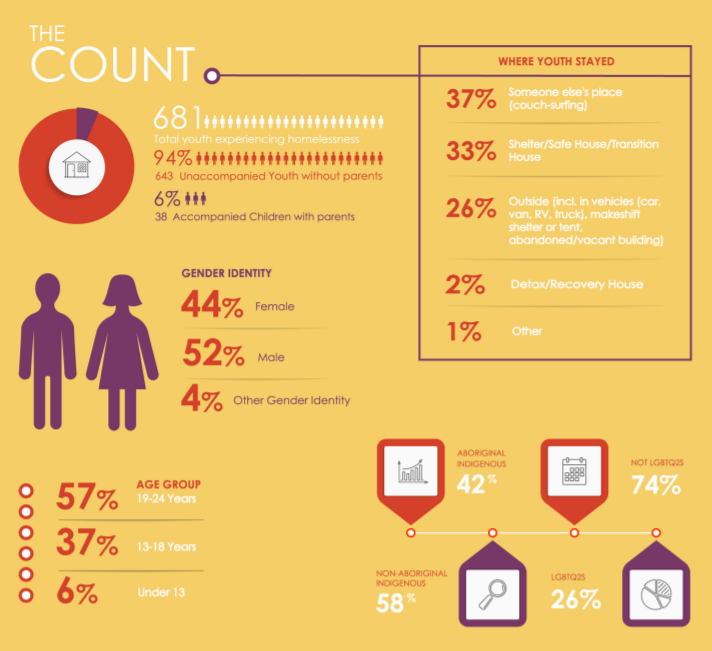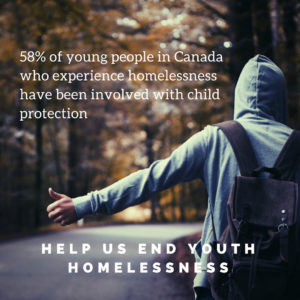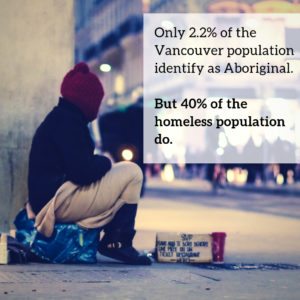For over twenty years, we’ve been fighting youth homelessness. But sadly, there are still too many young people experiencing, or at risk of, homelessness in Vancouver and across Canada. In fact, last year in Vancouver, at least 681 young people experienced homelessness every night. That’s 681 too many.
And this pattern is repeated across the country, with an estimated 30,000 young people experiencing homeless every year in Canada. These young people represent some of the most vulnerable members of our communities. They have overcome significant challenges in their lives, but face a difficult and dangerous future.
Who are the young people experiencing homelessness?
While anyone can be at risk of homelessness, unfortunately, there are structural factors that make certain people more at risk. Researchers carry out surveys to understand who is homeless at a given time. In 2018, the first ever Youth Homelessness Count in Metro Vancouver was carried out. It revealed that some young people are at greater risk of homelessness.
They found that 681 young people (aged 13-24) were homeless just in Metro Vancouver. Of those people,
- 52% left home for the first time because of family conflict
- 50% were in, or had been in, government care
- 42% were First Nations, Metis or Inuit
- 26% were LGBTQ2S
- 72% declared a mental illness
- 22% declared a physical disability
Why are these young people at risk of homelessness?
These statistics make it clear that there are complicated structural factors that lead to youth homelessness. Poverty, inequality, discrimination, lack of housing, and lack of inclusion all play a role. And the impact of these factors echoes through generations. Poverty and inequality can lead to family conflict, mental illness and to young people being taken into government care. The lack of stability, connection and community caused by social exclusion can make it more likely that young people become homeless.
Young people in government care are particularly at risk of homelessness. When they turn 19, their government support disappears, and they are suddenly on their own overnight. Unlike other young people, whose parents continue to support them long into their twenties, those leaving care are forced to become entirely independent at only 19. Often they have never received the knowledge, skills or resources they need to succeed. And it can be almost impossible to find and maintain employment without the stability provided by safe, affordable housing. Without support, it can be very difficult for young people to successfully transition to living independently.
How does homelessness impact young people’s lives?
When we think of being homeless, we might think about what it would be like to not have a safe, private space to sleep every night. And that is difficult enough: imagine not knowing whether you will be safe night after night. And beyond that, the experience of homelessness impacts nearly every aspect of a person’s life. Young people who experience homelessness report not having enough food to eat, declining mental health, low school participation, unemployment and criminal victimization. The lack of stability, income and support that comes with being homeless is something nobody should have to cope with.
And for many young people, it can be overwhelming. As well as a stable place to live, they need supportive relationships, access to training, education, jobs and the chance to develop the life skills they need. After all, like all teenagers, they were dependent on caregivers until they became homeless. And they’re still developing physically, cognitively and emotionally, which makes the transition to independence even more difficult. And crucially, many of these young people have experienced trauma, abuse and poverty that no child should have to endure. All of these factors make it much harder for a young person to succeed without support.
How can we help young people exit homelessness?
To help young people exit homelessness, for good, an approach called Housing First for Youth is recommended. This approach combines affordable, secure housing with additional supports. These supports help young people maintain housing, gain employment and build positive relationships. Housing First for Youth programs offer access to training and education, better health and wellbeing, and social inclusion. And most importantly, they take account of the views, experience and knowledge of young people experiencing homelessness.

Supportive relationships, goal setting, access to employment and improved wellbeing all help end youth homelessness
We know this approach works because we’ve seen it happen here at Zero Ceiling, where we offer a similar program of housing and support. Over the years, we’ve seen how the holistic, wrap-around support in our Work 2 Live program helps young people thrive. With compassionate, unconditional support, strong relationships, and opportunities to learn and grow, our program participants gain the confidence and skills they need to succeed. Having a stable home gives participants time and space to focus on personal growth and goals. By accessing employment and training, they gain skills that help them pursue a career of their choice. And through outdoor recreation, they learn to build healthy habits and live a healthy lifestyle.
The Work 2 Live program lasts 12 months. It expanded from a 6-month program in 2015, as we realised that a longer program meant greater stability and more opportunities for young people to learn the skills they need. And even once participants have graduated, they can never “age out” of Zero Ceiling. We provide practical and emotional support for our graduates whenever they need, just like a family. The relationships that they build in the program are vital, and they don’t end when their time in the program does.
A focus on prevention
It’s also vital that we focus on preventing youth homelessness, instead of only intervening once young people are already experiencing homelessness. Prevention saves young people from suffering in ways that are avoidable and will help ensure more young people never experience homelessness. Preventing youth homelessness means reducing poverty, providing more affordable housing and providing support for young people leaving care, among many other solutions. That’s why our Work 2 Live program is for young people at risk of homelessness, or in unstable housing, as well as those who are experiencing homelessness. We don’t need to wait to help young people make positive change and work towards living independently.
Youth homelessness: A problem that can be solved
We know a lot now about why young people become homeless, and how we can end this cycle. There are so many complicated structural, systems and individual factors that can lead to a young person becoming homeless. But there is also plenty we can do to ensure that support is available before that happens. We need to provide support quickly to help young people develop skills, feel part of a community and access affordable housing and meaningful employment. No young person should ever have to experience homelessness. And there is so much that can be done now to ensure that in the future, they never do.
If you are interested in finding out more about the causes, reality and solutions to youth homelessness, there are some great resources available including Opportunity Knocks, Without a Home, 2018 Youth Homeless Count – Metro Vancouver, and the Roadmap for the Prevention of Youth Homelessness.
Homeless Hub is a great website with loads of information about homelessness, and what needs to be done to end homelessness for good.



